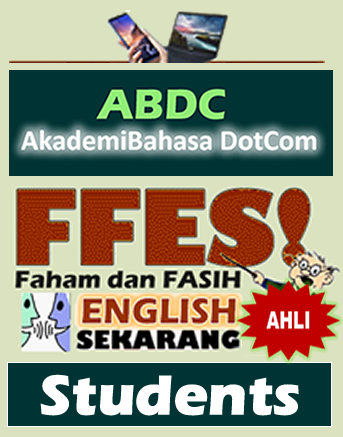EG/GBU 06 - "ING" - Bab 02
Tahukah anda bila masa mesti kita gunakan "ing" ?
Nanti, jangan cepat sangat menjawab. Jangan sangka jawapan anda TEPAT! Memang SALAH!
Fungsi, Kegunaan dan Pengertian "ING" menurut "learnenglish (British Council)":
We can use the -ing form of the verb:
• as a noun: Menjadikan dia NOUNS (UC)
I love swimming.
Swimming is very good for your health.
You can get fit by swimming regularly.
-ing nouns are nearly always uncount nouns
- as an adjective: Menjadikan dia ADJEKTIF
The main problem today is rising prices.
That programme was really boring.
He saw a woman lying on the floor.
Because the -ing noun or adjective is formed from a verb it can have any of the patterns which follow a verb, for example:
- ... an object: Menjadikan dia OBJEK
I like playing tennis.
I saw a dog chasing a cat.
- ... or an adverbial: Menjadikan dia ADVERB
You can earn a lot of money by working hard.
There were several people waiting for the bus.
- ... or a clause: Menjadikan dia CLAUSE
I heard someone saying that.
The -ing noun can be used:
- as the subject of a verb: Menjadikan dia SUBJEK
Learning English is not easy.
- as the object of a verb:
We enjoy learning English. Menjadikan dia OBJEK
Common verbs followed by an -ing object are:
| admit | like | hate | start | avoid |
| suggest | enjoy | dislike | begin | finish |
- as the object of a preposition Menjadikan dia OBJEK selepas KATASENDI
Some people are not interested in learning English.
The -ing adjective can come:
- in front of a noun: Adjektif mesti diletak sebelum NOUN
I read an interesting article in the newspaper today.
We saw a really exciting match on Sunday.
The commonest –ing adjectives used in front of the noun are
| amusing | interesting | worrying | shocking | disappointing |
| boring | surprising | exciting | terrifying | frightening |
| tiring | annoying |
- after a noun: Adjektif CLAUSE boleh letak selepas NOUN
Who is that man standing over there?
The boy talking to Angela is her younger brother.
- and especially after verbs like see, watch, hear, smell etc. digunakan selepas beberapa verbs seperti see, watch, hear, smell
I heard someone playing the piano.
I can smell something burning.
Tugasan KHAS
Sekarang barulah anda boleh menjawab soalan ini dengan jawapan yang TEPAT dan CEMERLANG! Barulah anda diiktiraf sebagai benar-benar FAHAM Bahasa Inggeris
Soalan kita ialah:
Bila masa mesti kita gunakan "ing" ?
Jawab melalui Whatsapp 011 2355 0669 atau telegram jika anda seorang student PREMIUM!

